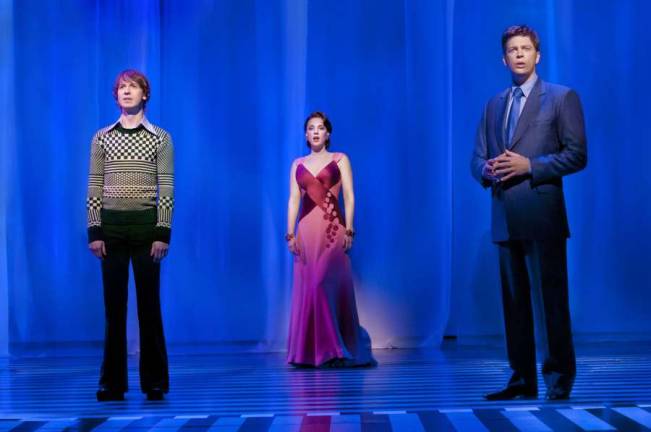Overcast, With a Chance of Boredom

The original book to the 1965On a Clear Day You Can See Foreveris widely acknowledged as abysmal-but it is solely on the basis of that show andThe Apple Treethat Barbara Harris' towering status as an icon of musical theater rests. Not bad for a show that is frequently dismissed, despite its gorgeous score by Alan Jay Lerner and Burton Lane. Director Michael Mayer and playwright Peter Parnell, however, thought they had the solution to the original, and have given audiences a radically reworked version that is just as flawed.
InOn a Clear Day 2.0, psychiatrist Mark Bruckner (Harry Connick, Jr.) is still mourning his dead wife, and young, gay florist's assistant David (David Turner) can't quit smoking or commit to his lawyer boyfriend. So the two of them end up in session together, where David reveals a talent for being hypnotized, and Mark discovers that David was a big band singer named Melinda Wells in a previous life. What does Mark do? He drags David all over Manhattan and puts him under hypnosis to spend the day with Melinda-when he's not somehow transported back to Melinda's pre-World War II world, complete with waiters, band members and hoity-toity lyricists.
The 1965 incarnation may have been listless, but at least it boasted Harris and John Cullum as its stars (there's a wonderful condensed version of the showavailable on YouTube). Here, we have Connick Jr., clearly uncomfortable with the big Broadway showtunes; Turner as a wan, charmless leading man who destroys the second act hit "What Did I Have That I Don't Have" by overacting; and, making her Broadway debut, the refreshingly talented Jessie Mueller as Melinda, playing her scenes with the steely strength and lovable vulnerability of a young Judy Garland and blasting out her songs with the precision and powerhouse vocals of a young Patti LuPone. Mueller's a-star-is-born moment comes in the second act, when she belts "Ev'ry Night at Seven," a song from the 1951 Lerner-Lane movie musicalThe Royal Weddingthat she invests with all of the personality, magic and sheer giddiness that the rest of the show is missing.
Mayer seems to have taken the story's new time period of 1975 as the guiding vision behind the production, beating audiences over the head with a succession of design elements that are almost laughably ugly. Costume designer Catherine Zuber reveals herself to be a fan of matchy-matchy clothes-at one point, Mark and his lovelorn co-worker both wear the same shade of blue while standing downstage between David and his boyfriend, outfitted in matching reds-corduroy and fringe, and Doug Besterman's orchestration of "Wait 'Til We're Sixty-Five" sounds suspiciously like that of "But Alive" from 1970's Applause.
The list of mistakes made in preparingOn a Clear Dayfor its second Broadway outing is a long one, topped by the utter ludicrousness of its book-howis Mark traveling back in time?-and underwritten characters. David is a flouncing cipher, and Turner brings no charisma or quirkiness to his performance. And the supporting cast members-including Sarah Stiles, making the most out of her dippy character-are mostly reduced to singing backup and filling the stage for hazy, hippie group numbers. The only person, behind the scenes or onstage, who emerges unscathed is Mueller, safely ensconced in her 1940s setting and, on a cloud of music, serenely rising above the bad acid trip that is the rest of the show. If she's not a Barbara Harris yet, she well may become one.
ON A CLEAR DAY YOU CAN SEE FOREVER Open run, St. James Theatre, 246 W. 44th St. (betw. Broadway and 8th Ave.),www.onacleardaybroadway.com; $54?$157.